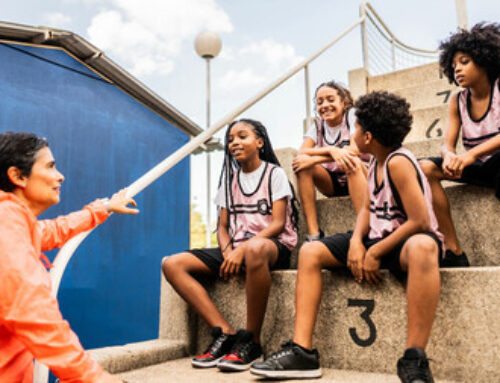Why You Shouldn’t Wait Until Your Junior Year of High School to Get Serious About College Sports
One of the most significant advantages I had when it came to NCAA recruiting was having parents who were forward-thinking.
I have a brother who’s three years older than me, and by the time I started high school, we was already being highly recruited. So I came into high school with a purpose and a goal of where I knew I wanted to be once I graduated. Having the goal of being a college athlete from the outset of my freshman year changed everything for me. I had an easier time making many decisions in my earlier years of high school because I knew what my goal was.
While traditional wisdom has generally dictated most athletes can wait until their junior year to get serious about playing sports in college, I believe many can benefit from thinking and acting like they’re going to play sports in college much sooner. Here’s why.
1. No Last-Minute Panic
Many high school student-athletes put zero thought into getting recruited until the twilight of their high school years. Sure, the very best athletes will actively be sought out by college programs, but what about everyone else? When they decide to finally act on their desire to play college sports, what happens next is often a lot of anxiety and panic. The student-athlete now has so many different things to figure out:
- What level of athlete are they?
- Should they pay for someone to help them in this process?
- Where do they fit in academically?
- How do they get in touch with a college coach? And what should they say?
- What events should they attend?
- Do they need to create a highlight tape?
- How do they earn a scholarship?
The questions go on and on! As the student-athlete and their family starts to unravel these questions, they realize they are way behind. Even if you play a sport where you cannot sign a letter of intent until your senior year, many college coaches know which student-athletes they are going after much earlier than that. That is not to say that you cannot have a fantastic senior season and get on their radar. But it does mean there’s zero downsides to getting the recruiting process started earlier in your high school career rather than later. If you know you want to play in college, spending some time during your freshman and/or sophomore year learning what recruiting entails and acting accordingly can pay dividends.
2. Getting a Strong Academic Start
No matter how talented or successful you are on the field, you will not go D1 if you do not meet the academic standards. When you start the recruiting process early, you can start preparing both academically and athletically for what is to come.
All too often, high school student-athletes find themselves scrambling to bring their grades up so they can attend a particular college and receive a scholarship. Not only does this approach often fail and result in the student-athlete having to take a detour at a JUCO or community college to get their grades up, but it can be highly stressful and take time and energy away from sports. Understanding the academic requirements it takes to get recruited and admitted by universities and colleges that interest you allows you to aim for those goals early as opposed to allowing yourself to fall behind the eight ball.
A lot of students hate school and don’t bother to apply themselves academically. When you come into school knowing exactly what classes you need to take and what your grades need to look like, you wake up with a new purpose every day.
You no longer are just going to school because you have to. You do your schoolwork to the best of your ability because you know you need it to get where you want to be.
3. Develop Real Relationships With Coaches
The earlier you can get on a coach’s radar, the better your odds of being recruited. In the weeks leading up to signing day, college coaches are bombarded with hundreds of emails, voicemails and letters from players they’ve never heard from before desperate for a place to play in college. By establishing communication early, you reduce your risk of having to be involved in this last minute free-for-all.
When you are an underclassman in high school, college coaches cannot reach out to you. However, you are allowed to contact a coach anytime and keep them updated on your progress. Let them know that you’re interested in playing for them, share your highlights, let them know what camps/events you’ll be attending, talk about what you’ve been working on, etc.
RELATED: How to Market Yourself to College Coaches
4. Builds Better Character
At the end of the day, a college coach may end up having to decide between you and another athlete. When everything else is similar, character breaks the tie. Coaches want high-character athletes who perform well both in sport and in life. They want kids who can become a moral backbone of their program.
Knowing that you want to play college sports early during your high school career can help you consistently act with better character and emerge as a leader on your team. Even asking college coaches what type of student-athletes they prefer recruiting can help you aim to live up to those standards both on and off the field.
5. Keeps Your Social Media Clean
Social media is permanent.
Even if you think you’ve deleted something, a screenshot may still be lurking out there somewhere. Anything you’ve posted on social media can and will be used against you in the recruiting process.
By optimizing your social media early, you do yourself a tremendous favor. A positive social presence can really go a long way towards endearing a college coach to a play, while a negative presence will do precisely the opposite. This guide provides several key tips on how high school athlete’s can use social media effectively.
6. More Time to Network
The earlier you know you want to play sports in college, the more time you give yourself to network and gain exposure. Go out to different events and use every opportunity you can to showcase your skills in front of college coaches. You want to meet and shake hands with as many coaches as you can while you are in high school. Let them see your face, your smile and that outstanding character that you have been working on. It will not happen unless you are intentional about it. If you wait until the spring of your junior year to star this, you’ll have significantly less time to build contacts.
Photo Credit: FatCamera/iStock
RECOMMENDED FOR YOU
Why You Shouldn’t Wait Until Your Junior Year of High School to Get Serious About College Sports
One of the most significant advantages I had when it came to NCAA recruiting was having parents who were forward-thinking.
I have a brother who’s three years older than me, and by the time I started high school, we was already being highly recruited. So I came into high school with a purpose and a goal of where I knew I wanted to be once I graduated. Having the goal of being a college athlete from the outset of my freshman year changed everything for me. I had an easier time making many decisions in my earlier years of high school because I knew what my goal was.
While traditional wisdom has generally dictated most athletes can wait until their junior year to get serious about playing sports in college, I believe many can benefit from thinking and acting like they’re going to play sports in college much sooner. Here’s why.
1. No Last-Minute Panic
Many high school student-athletes put zero thought into getting recruited until the twilight of their high school years. Sure, the very best athletes will actively be sought out by college programs, but what about everyone else? When they decide to finally act on their desire to play college sports, what happens next is often a lot of anxiety and panic. The student-athlete now has so many different things to figure out:
- What level of athlete are they?
- Should they pay for someone to help them in this process?
- Where do they fit in academically?
- How do they get in touch with a college coach? And what should they say?
- What events should they attend?
- Do they need to create a highlight tape?
- How do they earn a scholarship?
The questions go on and on! As the student-athlete and their family starts to unravel these questions, they realize they are way behind. Even if you play a sport where you cannot sign a letter of intent until your senior year, many college coaches know which student-athletes they are going after much earlier than that. That is not to say that you cannot have a fantastic senior season and get on their radar. But it does mean there’s zero downsides to getting the recruiting process started earlier in your high school career rather than later. If you know you want to play in college, spending some time during your freshman and/or sophomore year learning what recruiting entails and acting accordingly can pay dividends.
2. Getting a Strong Academic Start
No matter how talented or successful you are on the field, you will not go D1 if you do not meet the academic standards. When you start the recruiting process early, you can start preparing both academically and athletically for what is to come.
All too often, high school student-athletes find themselves scrambling to bring their grades up so they can attend a particular college and receive a scholarship. Not only does this approach often fail and result in the student-athlete having to take a detour at a JUCO or community college to get their grades up, but it can be highly stressful and take time and energy away from sports. Understanding the academic requirements it takes to get recruited and admitted by universities and colleges that interest you allows you to aim for those goals early as opposed to allowing yourself to fall behind the eight ball.
A lot of students hate school and don’t bother to apply themselves academically. When you come into school knowing exactly what classes you need to take and what your grades need to look like, you wake up with a new purpose every day.
You no longer are just going to school because you have to. You do your schoolwork to the best of your ability because you know you need it to get where you want to be.
3. Develop Real Relationships With Coaches
The earlier you can get on a coach’s radar, the better your odds of being recruited. In the weeks leading up to signing day, college coaches are bombarded with hundreds of emails, voicemails and letters from players they’ve never heard from before desperate for a place to play in college. By establishing communication early, you reduce your risk of having to be involved in this last minute free-for-all.
When you are an underclassman in high school, college coaches cannot reach out to you. However, you are allowed to contact a coach anytime and keep them updated on your progress. Let them know that you’re interested in playing for them, share your highlights, let them know what camps/events you’ll be attending, talk about what you’ve been working on, etc.
RELATED: How to Market Yourself to College Coaches
4. Builds Better Character
At the end of the day, a college coach may end up having to decide between you and another athlete. When everything else is similar, character breaks the tie. Coaches want high-character athletes who perform well both in sport and in life. They want kids who can become a moral backbone of their program.
Knowing that you want to play college sports early during your high school career can help you consistently act with better character and emerge as a leader on your team. Even asking college coaches what type of student-athletes they prefer recruiting can help you aim to live up to those standards both on and off the field.
5. Keeps Your Social Media Clean
Social media is permanent.
Even if you think you’ve deleted something, a screenshot may still be lurking out there somewhere. Anything you’ve posted on social media can and will be used against you in the recruiting process.
By optimizing your social media early, you do yourself a tremendous favor. A positive social presence can really go a long way towards endearing a college coach to a play, while a negative presence will do precisely the opposite. This guide provides several key tips on how high school athlete’s can use social media effectively.
6. More Time to Network
The earlier you know you want to play sports in college, the more time you give yourself to network and gain exposure. Go out to different events and use every opportunity you can to showcase your skills in front of college coaches. You want to meet and shake hands with as many coaches as you can while you are in high school. Let them see your face, your smile and that outstanding character that you have been working on. It will not happen unless you are intentional about it. If you wait until the spring of your junior year to star this, you’ll have significantly less time to build contacts.
Photo Credit: FatCamera/iStock
RECOMMENDED FOR YOU
Create A Free Recruiting Profile Today!
CaptainU helps athletes & parents not only be proactive but also to manage and take control of their entire recruiting journey.










